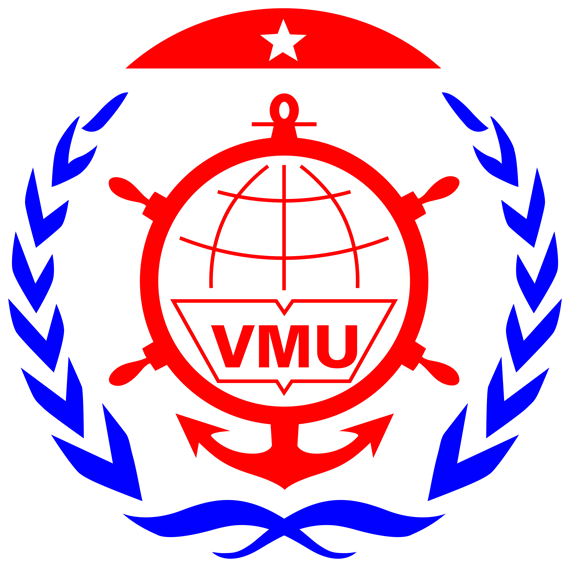1. Introduction
|
Program title: |
Bachelor of Navigation |
|
Graduation degree: |
Bachelor's degree |
|
Study model: |
Full-time |
|
Total credits: |
137 |
|
Used language: |
Vietnamese |
|
Training duration: |
4 years (8 semesters) |
|
Responsible Faculty: |
Faculty of Navigation |
|
Website: |
|
|
Address: |
A2 Building, Vietnam Maritime University 484 Lach Tray - Le Chan - Hai Phong |
The Bachelor of Navigation program at Vietnam Maritime University, designed by the Faculty of Navigation, integrates knowledge from leading international maritime universities. Continuously updated to align with the evolving needs of the maritime industry and in compliance with the regulations set by the Ministry of Education & Training and Vietnam Maritime University, the program ensures students gain essential knowledge, skills, and professional attitudes. It meets the Vietnamese National Qualifications Framework and international maritime education and training standards, equipping graduates to excel in the global maritime workforce. Graduates of the program earn a bachelor’s degree in Navigation, with the ability to safely operate vessels, manage maritime operations, and ensure compliance with international maritime laws. They are trained to be dynamic, creative, and adaptable ready to compete in the Asia-Pacific region and contribute to national development and international integration. The program prepares students for various roles in the maritime industry, including deck officers, port authority officers, maritime operations managers and maritime safety specialists.
The Bachelor of Navigation program at Vietnam Maritime University emphasizes both theoretical knowledge and practical skills, enabling graduates to operate and navigate vessels, manage navigation systems, responding to emergencies, and ensuring compliance with international safety regulations. They are well-prepared to meet the increasing demands of the maritime industry, ensuring safe and efficient sea transport and contributing to the development of the national and global maritime sectors.
2. Curriculum
Throughout the eight semesters of the Bachelor of Navigation program, students engage in a comprehensive curriculum that blends theoretical knowledge with practical skills. The Bachelor of Navigation program is organized into 8 semesters as follows:
In Semester I, students gain foundational knowledge and skills through Algebra, which emphasizes problem-solving, and Calculus, which focuses on analytical concepts to address problems in the engineering field. Introduction to Maritime Science offers insights into maritime science basics, while General Law covers the importance of laws in daily life. The General Physics 2 equips students with essential physical concepts to solve engineering problems. Geometry - Technical Drawing teaches the representation of real-world objects. Optional courses include Environment and Environmental Protection and Soft Skills 1.
Semester II expands on the fundamentals with Probability Statistics, enhancing data analysis skills, and Maritime Geography, focusing on global and Vietnamese maritime geography. Ship Knowledge introduces the main technical structures of ships, while Engineering Mechanics addresses mechanical problem-solving. Basic skills of seamanship covers essential seamanship skills. Basic English 1, MS Office Suite and Business Management are optional courses.
Semester III explores more advanced topics, including Marine Electrical Systems 1 and Marine Engineering. Maritime Safe Working Practices Management focuses on safety and risk awareness, while Maritime Communication improves radio communication techniques. Basic Terrestrial Navigation and Magnetic Compass delve into navigation techniques and the magnetic compass onboard. Optional courses include Basic English 2, Marine and Ocean Policy.
Semester IV covers advanced subjects such as Law of the Sea, focusing on international and national maritime law, and Celestial Navigation, which teaches navigation by celestial objects. Terrestrial Navigation advances navigation skills, while Maritime Meteorology and Oceanography addresses weather patterns and ocean currents. Basic English 3 strengthens language skills, and optional courses include Maritime Automatic Control and Life-Saving and Fire-fighting on board.
Semester V focuses on international maritime law with International Regulations for Preventing Collisions at Sea 1972, Maritime Law, and International Law on Maritime Safety. Ship Stability covers stability control. Specialized Internships provides practical experience, while optional courses include Port State Control, Receiving and Analyzing Weather Information, Maritime Applied Information Technology.
Semester VI dives into specialized areas such as Maritime Insurance, Shipping Operations, Electronic Chart Display and Information System (ECDIS), and Marine Radio Equipment. Maritime English enhances technical language skills for the maritime industry. Optional courses include Soft Skills 2, Container Operation and General Average.
Semester VII emphasizes specialized skills and knowledge. Electrical Navigation Equipment covers other electrical navigation system on board of the ship, while Cargo Handling provides advanced knowledge for cargo handling and stowage. Ship Handling teaches techniques for ship maneuvering. Optional courses include Tanker Operation and Offshore Service Operation.
In the final semester, students consolidate their learning through practical applications. Internship for graduation (on commercial ships) immerses students in real-world challenges. The Graduation Thesis showcases their ability to integrate and apply knowledge from previous semesters.
